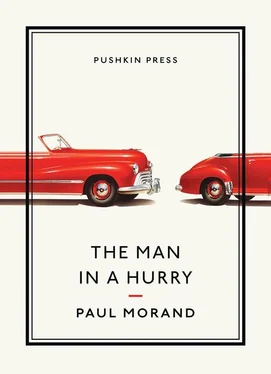For the time being, I am up to my neck in marmalade during the daytime, and at night I continue my scientific work in France’s third largest city, which is Bordeaux. What made me choose this city is that I know the Korean consul there, who has hopes of obtaining a Korean visa for me so that I can leave your beautiful country. I shall arrive in Paris a week on Saturday in order to put my affairs in order with your administrative authorities. May I call in to see you… if you are not rushing around too much? I have often thought of you. Have you displayed any fine symptoms of overexcitement recently? I wish you much happiness, by which I mean the quickest thing in the world, which is the Idea.
With my sincere good wishes, Monsieur Velocipedist.
Regencrantz.
PS The fakirs, who are motionless by definition, chose as a yardstick for the greatest speed imaginable the Idea, which they call mano-java. Mano-java goes around the planet far more quickly than the Hertzian wave: that is why I hope you go faster than the mano-java . R
“That good old Regencrantz!” said Pierre aloud.
“What?” Hedwige, still sleepy, murmured lazily. She turned her head towards her husband without opening her eyes. She was prolonging that moment of bliss when, like those goddesses in tapestries supported by cupids, she was hovering in the sky borne on the interwoven arms of all those whom she loved: Mamicha, Pierre, Angélique, Fromentine.
How happy she had been during the past fortnight! How delightful Pierre had become! How those momentarily closed hearts at Saint-Germain had reopened for her, the ungrateful but repentant daughter who had thought she could lead her life without motherly help… A mother wise and good, an omniscient mother, Mamicha had smoothed out everything, resolved everything. One night was all she needed. Having arrived the previous day, exhausted, disappointed and drained, Hedwige had set off again the next morning fortified and equipped once more with that surprising sense of security she felt when she was with her mother; it even seemed that, from a distance, Bonne had exerted her magical effect on Pierre, for he was transformed.
“What?” said Hedwige once more, without moving, so that she did not have to wake up completely.
Pierre handed Regencrantz’s letter to her.
“I’ll invite him to lunch,” he said.
“Who?”
“Regencrantz. He’s a Jewish doctor.”
“Did he look after you?”
“No, but I interest him.”
“Then he’s the one who needs to be looked after,” said Hedwige, making a charming expression.
“Thank you very much. I met him, dearest Hedwige, at a time when I was of no interest to anyone.”
“So were you feeling sad?”
“No.”
Hedwige considered this response for a moment.
“Tell me,” she went on, “would you feel sad now, Pierre, if I weren’t interested in you?”
“Yes.”
“So you think you need me?”
“Utterly.”
“Ut-ter-ly,” Hedwige repeated. “Are you sure about it? Explain yourself…”
“No, I won’t explain. Go to sleep.”
“Why don’t you want to explain?”
“Because it’s my business.”
“It’s mine too, and I need to know.”
Pierre sat down on the bed, pressing his face to that of his wife, and gently nibbled the base of her nose. She pushed him away.
“Be serious,” she said, “talk to me.”
“Hedwige,” said Pierre, “for me you are the present.”
Since she did not understand, he tried to make himself clearer.
“A present that I can live in, do you see, in which I can breathe, that has space… a present that’s truly present and no longer that evolving future I used to inhabit.”
Hedwige had got out of bed, put on a pink dressing gown like her mother’s and was laying the table for breakfast, an old Boisrosé custom she was unable to cast off; she opened a jar of sweet lemon jam she had brought back from Saint-Germain and started to dip into it.
“But all the same,” she said, “one can’t smell the future. It’s in the present that there are all the sensations: heat, cold, aromas, this coffee that you’re drinking, well everything!”
“Well, exactly, I couldn’t smell them. All those things you have just mentioned had no reality for me. My only reality was the future, and I firmly believed in this gaseous substance, open to billions and billions of formations and an infinite number of combinations!”
“And now?”
“Now that you’re mine, really and truly, and getting heavier, now that I can hear your fifty-five kilos causing the floorboards to bend, I have settled into the present day as I would into a padded armchair, I am bound by all sorts of exact needs and precise pleasures, I know that it is ten o’clock, that the hyacinth is white and fragrant, that the sun is pouring in, as huge as a Louis XIV brass, and that Hedwige has broken a cup trying to dry it…”
“Sorry,” she said.
“I was living on my own in the future; ever since you have been here, I’m no longer lonely and odd, I confront everything, and everything is straightforward, Hedwige, everything is suddenly so clear-cut, so calm. How lovely the home is when one doesn’t have to be making preparations for departure! How beautiful Paris is when you realize that you were born there… And all that, because you are . By giving you to me, God made me a present: the present. Admire the fact that the French language should have just one word for the two things!”
Doctor Regencrantz arrived on the stroke of one, a crafty look in his eyes, his ears full of angora hair, his bony, rabbinical nose set between two large bagpiper’s cheeks, very pink, very chubby, constantly looking as though he were rejoicing in the midst of the greatest difficulties, simultaneously discussing pathology, a detailed study of the French language, plans for departure and the making of marmalade.
To hit the right note, Pierre welcomed him with an embrace.
“Dear doctor,” he said, “I’ve missed you. Will you admit that you’ve missed me just as much and that you haven’t found many characters as interesting as me for taking what you call replicas?”
“What conceit! I file my index cards between two barrels of jams and I already have as many as I have visas on my passport!”
“I hope they will take you further.”
Hedwige came in wearing a long, flowing dress the same shade as her skin. Regencrantz looked at her without concealing his admiration.
“And so, gracious madame, you have married Monsieur Velocipedist,” he said.
“Velocipedist?” Hedwige repeated, intrigued.
“I reckon that suits him well. It was Goethe who coined the word. He spoke of a velocipedist future. He even added that we would die of it.”
“Do you hear that, Pierre?” said Hedwige.
“And at a time when the Weimar Gazette only came out once a week, Goethe was already forecasting an iron age when newspapers would appear three times a day.”
“The world has always moved quickly,” said Pierre with a shrug of his shoulders, “yet people no more know how to recognize speed than they know how to detect past beauty and former love affairs on the wrinkled faces of old women. ‘By taking the train too frequently from Paris to Saint-Germain,’ said Thiers in the 1840s, ‘one risks detaching the retina, so rapid will the succession of images be.’ I may add that my wife rather shares Monsieur Thiers’ view. Will you have an aperitif?”
“One only has to set eyes on madame,” said Regencrantz, “to realize that she is exactly the wife you need. Madame is a human character. Furthermore, madame is young and athletic, she won’t have any trouble keeping up with you.”
Читать дальше












